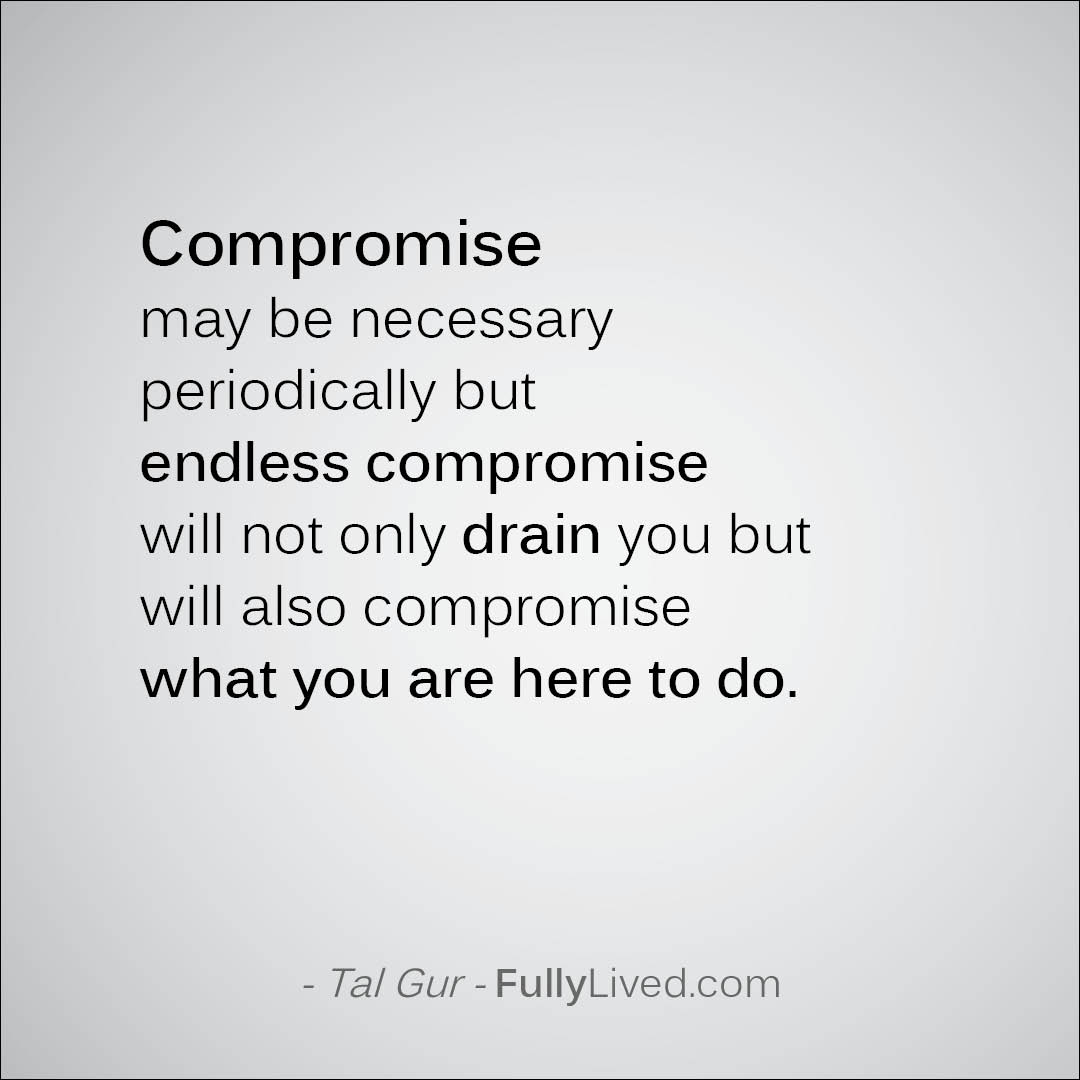Compromise may be necessary periodically but endless compromise will not only drain you but will also compromise what you are here to do.
The message conveyed by this quote emphasizes the significance of compromise in certain situations, while cautioning against an excessive and perpetual inclination towards compromise.
At times, compromise becomes an essential tool for navigating the complexities of life. It allows individuals or groups to find common ground, to bridge differences, and to foster harmony. Acknowledging that compromise can be a pragmatic solution to conflicts or challenges, the quote suggests that periodic compromise is not inherently detrimental.
However, the quote urges caution against succumbing to a perpetual state of compromise. When compromise becomes incessant, it not only drains one's energy but also poses a threat to the very essence of what one seeks to achieve. This warning implies that compromise, when taken to extremes, can dilute or undermine one's original purpose or goals.
By advocating against endless compromise, the quote invites us to reflect upon the nature of compromise itself. It encourages us to discern the boundaries between necessary concessions and the compromise that erodes our individuality, purpose, or core principles. It serves as a reminder that compromising too much can blur our sense of self, diluting the impact of our actions and compromising the integrity of our intentions.
Instead of incessantly yielding to the demands of others or forfeiting our own desires, the quote urges us to stay anchored in our purpose. It reminds us to assess each compromise in light of our long-term objectives, ensuring that we do not lose sight of our true path in the pursuit of temporary agreements.
In essence, the quote calls for a balance between compromise and unwavering commitment. It suggests that periodic compromise, when tempered with a clear understanding of our purpose, can be a valuable tool. Simultaneously, it advises against excessive compromise, highlighting the importance of safeguarding our identity and the integrity of our endeavors.
Ultimately, the message behind this quote encourages us to be discerning in our approach to compromise, recognizing that while it may be necessary at times, excessive compromise can deplete our energy and undermine the very purpose we strive to fulfill. By striking a balance between compromise and steadfastness, we can navigate life's challenges while staying true to ourselves and the mission we are here to accomplish.
Is there a historical example that illustrates the message of the quote?
One historical example that illustrates the message of the quote "Compromise may be necessary periodically, but endless compromise will not only drain you but will also compromise what you are here to do" is the American Civil Rights Movement of the 1950s and 1960s.
During this period, African Americans in the United States fought for equal rights and an end to racial segregation and discrimination. The movement was characterized by the tireless efforts of activists such as Martin Luther King Jr., who advocated for nonviolent protests and civil disobedience to bring about change.
While compromise was occasionally sought during the Civil Rights Movement, the quote emphasizes the idea that endless compromise can be detrimental to the pursuit of justice and equality. There were individuals and groups who advocated for a more gradual approach to civil rights, arguing for compromises that would appease the white majority and maintain the status quo.
However, leaders like Martin Luther King Jr. understood that endless compromise would dilute their message and compromise the core principles they were fighting for. They believed that the urgency of achieving equality required steadfast determination and the refusal to accept anything less than full civil rights and desegregation.
The Civil Rights Movement achieved significant milestones through persistent activism, protests, and legal challenges. The landmark Supreme Court decision in Brown v. Board of Education (1954) declared racial segregation in public schools unconstitutional, and the passage of the Civil Rights Act of 1964 and the Voting Rights Act of 1965 further dismantled discriminatory practices.
The lesson from this historical example is that while compromise can play a role in advancing social change, unwavering commitment to core principles and goals is essential. Endless compromise can dilute the impact of a movement and hinder progress toward achieving the transformative change necessary to address systemic injustices.
* If you're looking for more inspiration to help you on your personal development journey, you may want to check out my extensive list of SMART goals. This page is packed with thousands of different goal ideas that can help you set new aspirations and reach higher heights in your life. Personally, this page helped me to create my own 100 life goals list, which I pursued for over a decade.
Chief Editor
 Tal Gur is an author, founder, and impact-driven entrepreneur at heart. After trading his daily grind for a life of his own daring design, he spent a decade pursuing 100 major life goals around the globe. His journey and most recent book, The Art of Fully Living, has led him to found Elevate Society.
Tal Gur is an author, founder, and impact-driven entrepreneur at heart. After trading his daily grind for a life of his own daring design, he spent a decade pursuing 100 major life goals around the globe. His journey and most recent book, The Art of Fully Living, has led him to found Elevate Society.























